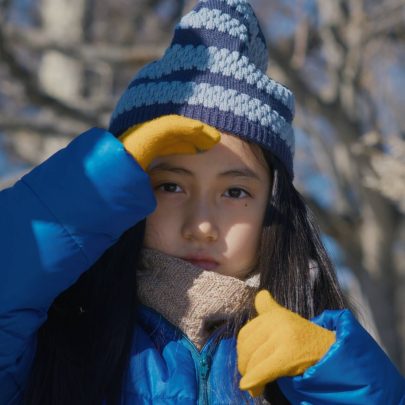Aug 1, 2016 Film & TV
So that was 17 days plus an opening night of films, and now it’s August. You’d expect to be a little dazed; and I am a little dazed. Shortly I will take my brain out and leave it in the sun to air, while I lie down somewhere and enjoy the interior silence. But first, some final weekend astonishments, the inevitable and necessary highlights list (which is in fact one of the things I live for, because I’m a hopeless OCD list maker), and a last word.
The astonishments
There were two, and they were, not quite to my astonishment but certainly to my surprise (because I was looking to dramas to provide my closing highlights), both documentaries. I insist they were, although the festival opted to put Aleksandr Sokurov’s interrogation of the history of France’s greatest art museum, Francofonia, in the fiction part of the programme. I am not going to be tedious about this, but it needs to be said: all documentaries are fiction, and the ones that know it are the ones that tell the most truth. The reason it needs to be said is that it’s something Sokurov manages to insist on himself, and without at all being tedious; he makes a great game out of weaving overt fiction and ostensible fact together. This is a film where we encounter Napoleon strutting through the Louvre, explaining his own importance to a woman who seems not to hear him. (She’s a personification of French history, because of course you’d find one of those in the Louvre.) Meanwhile Nazis occupy Paris, and Sokurov himself wanders invisibly through the museum, musing on its many pasts, and on the nature of art. Aspect ratio changes and other simple visual moves continually highlight the artificial and interpretive nature of what we’re watching, which could have been annoying if the camera work had been less accomplished. This whole film could so very easily have been a pretentious nightmare. Instead it’s one of the smartest, most moving and most beautiful things I saw at this festival. It also serves to demonstrate how much Sokurov’s one-take survey of the history of the Hermitage museum, Russian Ark — of which I’m very fond — was a lightweight stunt. When he allows himself the basic tool of editing — the cut — he can throw ideas against each other so much more effectively.
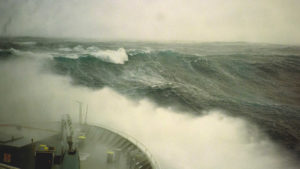
The other great surprise of my final festival weekend was On An Unknown Beach, a “speculative documentary”. I went to it because it sounded unlikely and interesting. This is a very good way of finding great films, so long as you don’t mind all the times when it disastrously fails to work. I more or less expected this to be one of those, because — well. Because the film was billed as an attempt to tease out visual and intellectual connections between post-quake Christchurch as seen by a noise artist, the sea bed as studied by a marine biologist, and the recovered memories of a poet undergoing hypotherapy. If I had to provide a case-in-point instance of “high risk film”, that would do nicely.
In this case, high risk translates to high rewards. The film requires effort — do not come to me later and complain that I didn’t warn you there’d be work involved — but it’s dazzling. It has the helpful virtue of being stone-dead gorgeous; the cinematography is hypnotically good from first to last, meaning that when you find yourself not grasping something, and that will happen, you can relax into the beauty of the moment. Even when the moment is not conventionally beautiful. One of the strongest moves from co-directors and co-cinematographers Adam Luxton and Summer Agnew comes early in the film, when they shift from ocean scenes with a powerful subsonic sea roar to security camera footage of one of the two big Christchurch quakes. The footage, unlike the beautiful ocean images we’ve just been seeing, is grainy and low quality. That gives it a certain authenticity which becomes more arresting as it becomes obvious what we’re seeing. But what really allows the moment to grip you by the throat is the total lack of sound: we go from booming sea sounds to dead silence. It respects the reality that security cameras don’t capture sound, while pushing the deeper reality – that earthquakes are vastly loud – out into the realm of the surreal. We’ve seen these images so often now, but seeing them this way let me see them properly again. Which gives you a sense of how smart these film makers are, and that intelligence informs every frame here. The organising idea is highly abstract — it’s about the hidden connections between people mapping the unknown in a range of different spheres, and about the idea that unrelated ideas are in fact always somehow related, if you dig deep enough. I really did not imagine anyone taking this as a starting point to produce such an improbable, rewarding film. A large crowd saw it with me, which was particularly pleasing, considering that in the same time slot the Auckland Philharmonia was just down the road at the Civic, accompanying the annual closing night silent film.
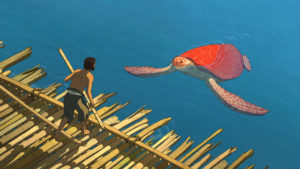
I’ve seen a bunch of other good things in the last few days. None was quite as good as these two, and a couple I’d invested a lot of expectation in were disappointing. (Always a risk when you allow yourself to expect great things.) You should definitely see The Red Turtle, if you can; it’s a simple, powerful animated film about a man trying to escape a deserted island after a shipwreck, and if you trust me, see it with no further information up your sleeve. As with so many films, the less you know in advance the better. The Salesman, from Iranian god-among-men Asghar Farhadi, is the wrenchingly strong drama you’d expect it to be. Nothing else he’s done has ever quite lived up to my expectations in the wake of A Separation, which remains one of my favourite films of the last decade; but do not mistake this for a criticism. This is not a criticism either, but it may be worth knowing: where A Separation opened up parts of contemporary Iranian society for me in the process of telling its devastating story, The Salesman is in a couple of areas very slightly opaque unless you bring a little knowledge of Iran with you to the theatre. (Specifically, it would help to know a bit about the interplay between the superficial westernisation of certain social strata in Tehran and the underlying moral conservatism. How characters act in a couple of key moments, and the options available to them, turn on points of cultural constraint which can be inferred only broadly. This won’t stop you appreciating the film. Its final fifteen minutes, especially, are powerful beyond belief.)
Tokyo Story. Oh yes indeed. If you ever have a chance to see it on the big screen, don’t hesitate. I had only ever seen it at home, and as I’d hoped, its dense compositions and its gentle sadness and humour all opened out and gained gravity on the big screen. (Your chance to see it at the Civic is gone, and gone for a long time. Um. Sorry. It was so good to see it there.) To be clear — “gentle sadness” refers to the pervasive mood of much of the film. Its cumulative emotional impact is harsher. This is one of the most celebrated films of last century, and it lives up to its rep.
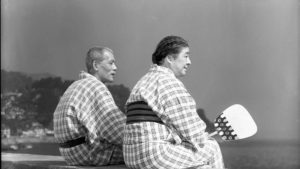
Those two disappointments? Midnight Special and Cameraperson. The former has a flat-out-fantastic action-suspense first act, but then moves towards a weakly generic ending which undercuts everything its opening half does so well. (The genre in question is science fiction, and I imagine the ending would work a lot better for anyone who hasn’t seen or read much of that. But the relevant did-same-thing-better precursors include such classics as E.T., Star Man, Close Encounters of the Third Kind, and a long list of other films that most people who don’t think of themselves as SF geeks will nonetheless have seen. So I have difficulty working out who this ending will be able to surprise or thrill. Children, presumably. But the film isn’t for them.) Cameraperson works well enough as an anthology-memoir, threading together footage from documentary cinematographer Kirsten Johnson’s long backlist of major features. But as an interrogation of the relationship between documentary makers and their subjects, it was relatively naive; the lack of voiceover narration, which normally I’d welcome, left its ideas feeling at once overstated and underdeveloped. Despite several moments of uncommon power — Johnson has filmed some important and disturbing things over the years — the film as a whole felt a lot like watching someone’s outtakes reel.
The inevitable and necessary highlights list
I saw 55 films at this festival. First, in order, the absolute standouts. If you’re a fellow list junkie you may notice that the order has shifted around slightly since mid-festival. The short explanation for this would be that the process of watching films doesn’t finish when the final credits roll. (Which could be taken as an argument for treating all lists as not merely subjective but also provisional. Um. I didn’t mean to get into this.)
- Sieranevada A surprise and a delight. The family gathering movie reinvented as comedy, tragedy, deep social realist character piece, farce, and high drama. Came out of nowhere and blew my socks off.
- Personal Shopper Effortlessly floated above the reach of my high expectations. A very modern ghost story and a study in sophisticated cinematic storytelling. Kristen Stewart demonstrates (again; but she’s never had a film so much to herself as this) that she’s an actress to take very seriously.
- The Rehearsal Takes Eleanor Catton’s you-would-think-screen-resistant first novel and translates it to the screen with so much panache, you could enjoy it simply as the ultimate adaptation how-to guide. Crackles with intelligence and wit from its first second to its very last. Great performances throughout.
- Happy Hour It’s over five hours long, and I wouldn’t cut a minute of it. Four thirty-something women in contemporary Japan: the extraordinary interiors of ordinary lives. An example of what you can do with a character-driven story when you give yourself more room to move.
- Francofonia See above. A masterful example of self-aware documentary-as-art.
- On An Unknown Beach See above. One of the most beautiful and questingly intelligent films at this festival.
- A Perfect Day The closest thing in this list to a film that would be at home in a multiplex, and an example of how to combine sharp-edged comedy and hard-hitting war drama while keeping a light touch. Pure pleasure throughout. Benicio Del Toro scores this festival’s highly coveted So Damn Cool award.
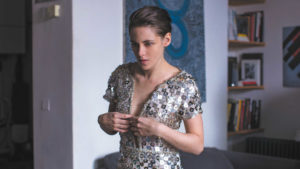
I was not aiming for a top ten, but it happens that two more films have to be ranked with these. They’re both remastered classics, and I’m not going to put them in the main numerical sequence; I wouldn’t let Stravinsky or John Lennon into a list of the year’s most exciting new compositions, either.
Chimes At Midnight Orson Welles. Shakespeare’s Falstaff plays. I mean really. Description is superfluous.
Tokyo Story Aging parents visit their adult children in the big city. The simplest of stories. One of the glories of Japanese cinema.
The rest of my highlights are listed in the order in which I happened to see them. They are all films I loved; they were the backbone of my festival; and ranking this many films in a way that feels fair to all of them turns out to require more processing power than my brain can currently generate. (If my brain were granted independent life, it would at this moment be about to secede from the rest of me and go in search of a tropical beach to lie on.)
Lovesong Quiet, piercingly well observed, cuts right to the heart of things. And of people.
Les Demons Screams originality from every frame. A powerful new voice takes us into the mind of a ten year old boy in Montreal. He’s a nice kid. But his mind is a scary place, in ways you may not see coming.
Tower Animated documentary on a 1966 mass shooting in Texas, focusing on the victims and the helpers. Insightful and arresting, and, alas, full of contemporary relevance.
The Daughter Grand classical tragedy, Australian style: and what style. Sam Neill and Geoffrey Rush lead a superb ensemble cast.
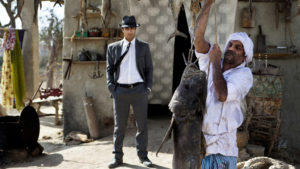
The big crazy cult film of this festival, courtesy of Iran: a country whose vibrant contemporary film scene can now boast a self-referential faux-documentary noir political mystery X-Files shaggy dog thriller. As we all wish our national film scenes could.
Poi E So much heart. The story of the man who made the song than served as a cultural pivot point, told with love and intelligence.
Captain Fantastic Don’t you wish Viggo Mortensen had brought you up? Because then you too could be a brilliant super-fit anarchosocialist intellectual of limited social experience, and you too could go out into the world and have tragicomic adventures. So. Much. Fun.
Weiner Don’t you wish you’d married Anthony Weiner? No. You really do not. This brilliantly entertaining account of why the woman who did marry him agrees with you is also one of the best things you’ll see about the American political system, in this year of our Lord oh-please-please-please-not-Trump.
Aquarius Expansive, generous character piece, showcasing the great Sofia Braga, who has a very good time demonstrating why she deserves the attention.
Fire At Sea The life of a small boy on a little Meditteranean island, and the desperate stuggles of African refugees to reach that same island: we see both, without morals drawn or overt commentary of any kind. Eloquent, compassionate, instructive.
Animation Now! Indie La Wildly diverse, consistently entertaining anthology survey of animation in LA. This is what good curation looks like.
A Quiet Passion Emily Dickinson gets the biopic she deserves — or not, because I should tell you this is the film I’ve had the most arguments with friends about. I adored it.
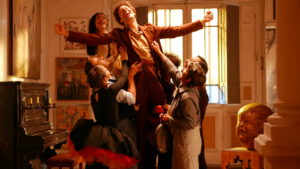
Endless Poetry The term “magic realism” could have been invented for Alejandro Jodorowsky, but I prefer the term “batshit genius”. A personal memoir of life as a young man, told with the insight of an old one, and the energy of a two year old on a sustained sugar high.
Sand Storm The daughter of a traditional Bedouin family falls in love with the wrong man. This is not just a dramatic exploration of the terrible pitfalls of honour-based patriarchies, though it’s certainly that. The most complex and moving interactions here are between the daughter and her formidable, appropriately terrified mother.
The Salesman Farhadi returns to Tehran: and that should be all you need to know. Tightly constructed, morally complex suspense, strongly acted.
The Red Turtle Studio Ghibli’s first-ever international coproduction. You’d have to think it would take a very good animator to tempt Japan’s most famous animation studio to give him their support. You would be correct. One for nearly all ages. (A little too emotionally complex, and in places upsetting, for the very smallest film-goers.)
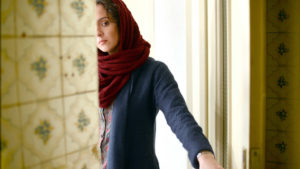
The Last Word
If I were going to limit myself to a literal last word, it would be “thanks”. Every film that makes it to the festival is highly scrutinised by a range of well informed cinephiles, but most of the people who work for the festival don’t get to see most of the films. It turns out that running the most complicated multi-center arts festival this country has takes too much time and effort for that. Thanks also to well behaved audiences, friendly random people met in and out of screenings, film-going friends for useful recommendations and even more useful arguments; and, obviously, thanks to the person who stole my bike, for reminding me that my biggest problems are small ones.
No, wait – it was the film makers, individually and collectively, who reminded me of that. Thanks to the film makers for the gift of perspective. We go to films to see through other people’s eyes. There’s nothing like it. See you back here next year.



